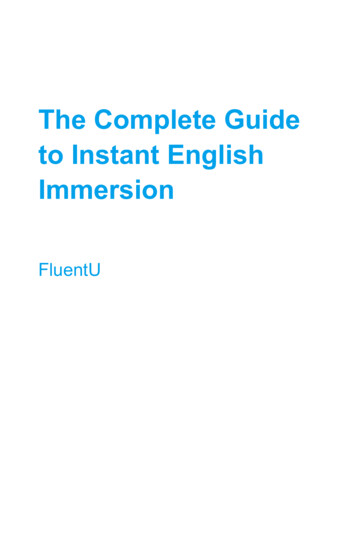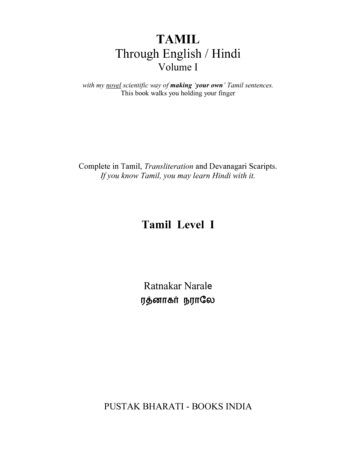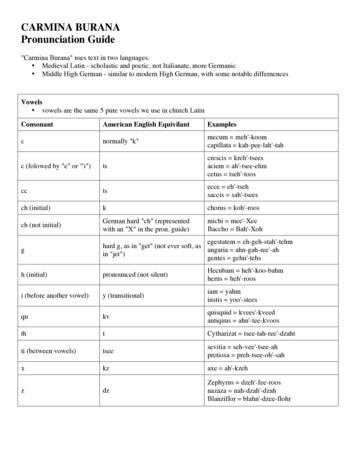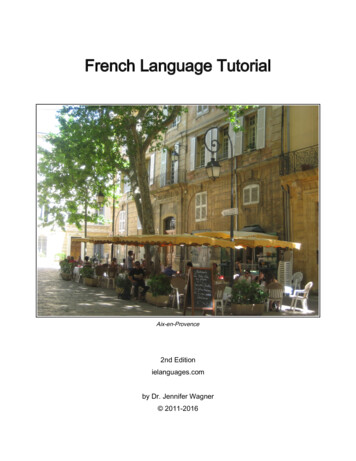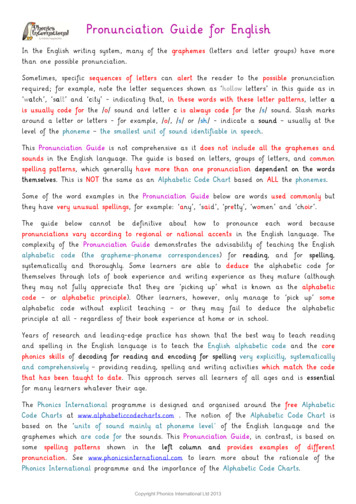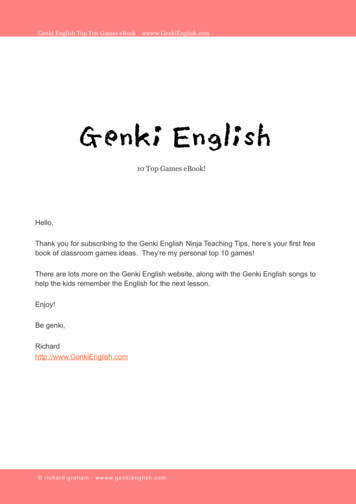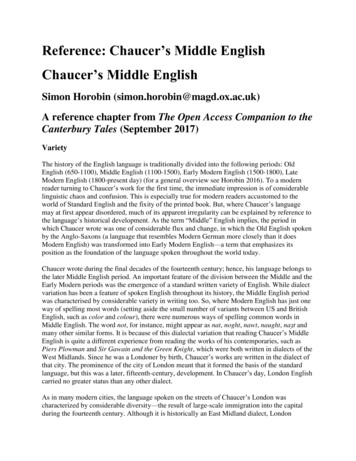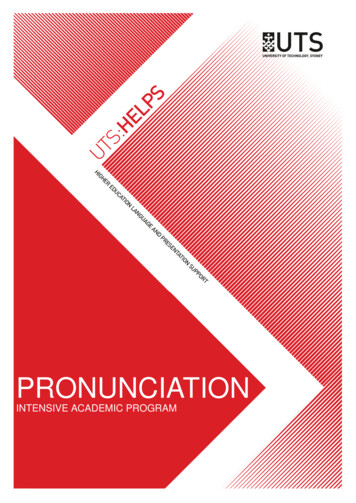
Transcription
English PronunciationPart OneThe Sound System of EnglishChapter 0 The Symbols 01Familiar Consonant ekissnicecashginger[tN]checkcatch[dI] judge[m][n][H]matenetsingtametensinger[l][r][ ]liferoadbellcleardoorfile[j][w]yeswaryearweird1
02Vowel Symbols[i][0][e][G][ oiceChapter 1 The vowel of English and its movementξ1 The basic notion of English vowelsfront central backiu highIUe o midE çQAlow2
Chapter 2 The vowelξ1 The vowels [i] & [0] 03The vowel atdeepteethfeetSentences:1. He sees the key point.2. Please leave me in peace. 04The vowel [-i] in -y or -ly1. easy2. busy3. studySentences1. I’m happy to see you’ve learned how to take it easy.2. Finally I can get away from my busy life. 05The vowel itSentences:1. This kid is sick; he is shivering.2. Give him six minutes to finish the quiz. 06Contrast [0] and tences:1. At least you can give me a list.2. The sheep are on the ship now.3
ξ2 The vowels [e] and [G] 07 The vowel tences:1. The weather there is great.2. The red pepper does not sell well in the west. 08The vowel tbatedatetakecakeSentences:1. They played all day.2. What’s your name? Are you James? 09Contrast [e] and Sentences:1. I met my roommate yesterday.2. Put the pepper on the paper.ξ3 The vowels [ ] 10The vowel [ :1. I’m not mad, but I’m sad.2. I’m glad that Jack is back.4
11Contrast [G] and [ ences:1. I guess the fire was caused by gas.2. The dragon had two heads.3. He said he was sad.ξ4 The vowels [A] and [K] 12The vowel [A]1.2.3.4.5.oddBobjobfoggodop (operation)popjotfoxgotSentences:1. There are a lot of odd jobs in this area.2. Bob stopped the clock after he talked to the cop. 13The vowel [K]1. uglyup2. budbut3. dugduck4. loveluck5. cubcupSentences:1. The funny duck is running around the jug.2. My other brother doesn’t seem to have trouble with my mother. 14 The words with the vowel [K] that are easily mispronounced for ESL orEFL 8.9.10.5brothercountrymothercoupledouble
15Contrast the vowels [K] and [A]1.2.3.4.5.upduckbucksluckgutop (operation)dockboxlockgotSentences:1. The government seems to be bothered by some kind oftrouble.2. Shut the door, or you’ll be shot.ξ5 The vowel [C] & [o] 16The vowel htertaughtcaughtSentences:1. You ought to sit in and audit the course.2. He bought some chalk for his daughter. 17The vowel [o]1.2.3.4.5.ohbow tSentences:1. This is an old show about a goat.2. He told me that it was cold outside and gave me the coat. 18Contrast [C] and caughtSentences:1. He bought a new boat last week.2. He showed me the original copy of Shaw’s work.6
ξ6 The vowels [u] and [?] 19The vowel psbootflutetoothmootSentences:1. Sue bought a new suit.2. Which will you choose: food or juice? 20The vowel footcookSentences:1. He looks like a good cook.2. A good-looking woman wants to buy the book. 21Contrast the vowels [?] and ooseSentences:1. You need to choose a good cookbook.2. The food looks good. Can you put it in my room?ξ7 The vowel [D] ilotbeautifulbulletcampusSentences:1. It occurred about ten days ago on this campus.2. We supported him and selected him as our new pilot.7
ξ8The vowels [a0], [a?] and [C0] 23The vowel deicepricebitesightkiteSentences:1. The sky was so wide that it surprised us all.2. We tried to lie side by side and kept silent for a while. 24The vowel [a?]1.2.3.4.5.ourbow outcountaccountSentences:1. Just imagine two cows sitting on a couch—it’s crowded.2. I doubt what he found in this town can count. 25The vowel noiseSentences:1. The boy’s toy made a lot of noise.2. We cannot avoid being annoyed by the voice.ξ9 The vowels followed by “r”: ["], [Ar], [0r], [Gr], [Cr]/[or], [A0r], [A?r], [(j)?r] 26vowels [i] followed by feartear (n.)Give me a beer, please.She can’t hear anything with her ears covered.8
27vowels [e] followed by ences:1. There are still bears in the bay area.2. If you don’t care, I’d rather you share the room with Clare. 28vowels [A] followed by ces:1. Bob doesn’t play the guitar; he plays the harp.2. The guard is not smart, but he has a good heart. 29vowels [C] or [o] followed by [r]1.2.3.4.5.ohbow (n.)PoefoecoatorborepourfourcourtSentences:1. The court house was torn down during the war.2. There’re four doors for you to explore in this game. 30vowels [D] followed by omesticUnstressed [Q] stressed irtySentences:1. The worm is busy working.2. If you get hurt, you’d better see a doctor.9
31vowels [a0], [A?] and [(j)u] followed by nces:1. The power of your empire is no longer secure.2. I hired a tour guide to lead me to the ancient tower.10
Chapter 3 The consonantξ1 The consonants [p] and [b] 32The consonant isbeeforbidobeyrebel 1. We’d better stop his barbaric behavior.2. The book you bought from Bob is a fable. 33The consonant aplipgrapemapstopSentences﹕1. People in this town paid a lot to keep the public park.2. Perhaps you should put this point into your paper.ξ2 The consonants [f] and [v] 34The consonant nces:1.2.There is a Seven Eleven on Vista Drive.I can prove that it was Steve who saved my life.11evelive (v.)savelovestarve
35The consonant safecheflaughSentences:1. Philip refused to take food from these families.2. Don’t laugh at the fat boy; he has suffered enough. 36Contrast [b], [p], [v], and ntences:1. The vigorous pig is trying to eat the figs.2. The five survivors wanted to buy a pie.ξ3 37The consonants [t] and [d]The consonants dfadebedsadSentences:1. The mad dog is still standing near the window.2. I don’t think your dad is a candidate for the presidency.12
38 The consonants [t][t]1.2.3.4.5.tear entences:1. My top duty is to protect my property.2. I need to take an important test tomorrow.ξ4 39The consonants [s] and [z]The consonant baselesspassSentences:1. Excuse me, can you pass the salt?2. I really miss my singing lessons. 40The consonant esayshasSentences:1. Zoe wants to see the zebra in the zoo.2. I feel exhausted because I zipped up here on foot.13
41Contrast [s] and zrazorSentences:1. Sue didn’t see any zebra at the zoo.2. Cell phones buzz here and there on the bus.ξ5 42The consonants [N] and [I]The consonant eashfishfleshcashharshSentences:1. We put the fish on the shore and went back to the ship.2. She went shopping yesterday and bought me some shirts. 43The consonant 1. I usually dress casually on this kind of occasion.2. It’s a great pleasure to share the treasure with you.14
44Contrast [N] and ntences:1. It’s my pleasure to be able to get rid of the pressure.2. This conclusion is not a solution.ξ6 45The consonants [tN] and [dI]The consonant t-[tN]1.2.3.4.5.eachitchHstretchcatchSentences:1. The children were chanting in the church.2. Can I change my clam chowder for lamb chops? 46The consonant geageedgebadgeSentences:1. I suggest you finish your college education first.2. Jeff has managed to send a message to the judge.15
47Contrast [tN] and sesheepshipshareshedshowsshoesSentences:1. Sheep are cheap in this country.2. Don’t wash your watch in hot water. 48Contrast [dI] and [I][dI]1.2.3.4.5.[I]enlargepagea huge leasureSentences:1. It’s time to enlarge the garage.2. This page is not beige; it’s brown.ξ7 49The consonants [L] and [M]Practice the following words with [L] sound in different -[L]1.2.3.4.5.teethmythfaithdeathmathSentences:1. I thought about nothing but math today.2. The author has something to say about his third book.16
50Contrast [s] and massteethmythfaithtenthmathSentences:1. He forced me to put the mouse into my mouth.2. Don’t tease him about his teeth again, please. 51Practice the following words with [M] sound in different 2.3.4.5.teethebreathebathesmoothsootheSentences:1. The father was there with them.2. Though they are mothers, they know nothing about their baby’steething problems.17
52Contrast [d] and oughtthattheseSentences:1. How are they doing today?2. That is my Dad.3. They dare not to go there.ξ8 53The consonants [k] and [g]The consonant eksickachebookcokeSentences:1. Let me make you a cup of coffee.2. I locked myself out and I’m looking for the key. 54The consonant eaguebigvagueegghogSentences:1. The big guy was engaged in the gangster’s fight.2. Don’t forget to get your bag when you go home.18
ξ9 55The Consonants [m], [n], and [H]The consonant mmediatepermit eroomSentences:1. I only make a small amount of money every month.2. They have the same name and that’s the problem. 56The consonant meaninpainlanedoneSentences:1. No. I can’t see you now. Can you come back at noon?2. I was so nervous on the canoe that I didn’t notice whathappened to Nick. 57Contrast [m] and nthensaneSentences:1. My son had some cake and left for school.2. He seemed to have seen a ghost.19
58The consonant .5.singersinginghangerhangingbringingSentences:1. The young singer sang a song.2. English is not my mother tongue but I think I am doing fine. 59Contrast [H] and onguesunSentences:1. The thing you brought home is really thin.2. He rang the doorbell and ran away. 60Contrast [H] , [g] and [dI]-[H]1. singer2. hanger3. 4. long, longer, longest5. young, younger, youngestSentences:1. Don’t hang around here. It’s dangerous.2. You’re too young to manage your anger.20
ξ10 The consonants [r] and [l] 61The consonant arecartourfireSentences:1. We have to rearrange our tour because of the rain.2. Right or wrong, you’d better run before you get arrested. 62The consonant [l]-[l]-[l]1.2.3.4.5.lead (v.)loselawlaplate1.2.3.4.5.-[ alpencilSentences:1. Millions of people travel around the world every day.2. Learning a new language is delightful, but it is also difficult.3. The little man arrived with letters in his mailbag.ξ11 The consonant [h] 63The consonant Sentences:1. He hopes that he can buy a house with a huge yard.2. Sometimes it’s hard to understand human behavior.21
ξ12 The consonants [j], [w] and [hw] 64The consonant ureaucutepeculiarsecuritySentences:1. Tell your lawyer that I’m not going to yield yet.2. Yuck! How can you eat yam, papaya, and yogurt together? 65The [w] tySentences:1. We acquired our first language when we were children.2. Wow! What is this? Is it a whale?3. We will have to work hard this week to clear this wood.ξ13 The /t/, /d/ or /n/ sounds pronounced as a flip [R] 66Consonants /t/, /d/ or /n/ pronounced as 5.Sentences:1. The pretty lady is waiting in the meeting room.2. I noticed that the teddy bear is very dirty.22meaningthinnerrainingmanyplanet
ξ14 The vocalic nasal & glotttal stop 67The vocalic nasal & glotttal stop tences:1. I certainly know that this burden shouldn’t be yours.2. She didn’t let me see her secret garden.23
Chapter 4 The clusters of English consonants 68The clusters with [c], [g], [b], [p]” followed by asureSentences:1. Please come to meet me at the glee club.2. Let’s clean the wall and clear the path. 69Contrast the following llapsebelowpolicecolleenbelieveSentences:1. Please call the police.2. I can’t believe it. I’m bleeding.ξ2 70Consonant clusters with [c], [g], [b], [p]” followed by [r]:The clusters with [b], [p], [f], [d] followed by ldrapedressdragSentences:1. My brother drove to Springfield with his friend.2. Fred was afraid to talk to the priest.3. I’m proud of you and you just proved yourself to be a very braveboy.24
71The clusters with [N], [t], [L], [k] and [g] followed by gretSentences:1. There’re only three trees left that are still green.2. I regret to tell you that our trip to the tropical forest has beencanceled.3. The creek near the school is a potential threat to our children.ξ3 72Consonant clusters clusters of /sk/, /sp/, and /st/:The clusters of /sk/, /sp/, and llstickstaysteakSentences:1. You can follow the stone steps to get to the square.2. We have to speed up and go straight to the school.3. It’s strange to see so many people skating on the street.ξ4 74The cluster of [rl]The cluster of ["l]1.2.3.4.5.worldgirlcurlEarlpearlSentences:1. You’re the best girl in the world.2. They want to send Pearl into a girl’s school.25
Chapter 5 The pronunciation of inflationsξ1The sound of the inflectionsThe most common inflections in English are the conjugations andplural-singular forms or nouns, possessive forms. This section will focuson the sound changes caused by the inflectional suffixes “-ed” and “-s”or “-es.”ξ2Below is the rule for predicting the sound changes of “-ed”:If “ed” is added to the consonants /d/ or /t/, it should be pronounced as[Æd]. If “ed” is added to any other voiced consonant, it should bepronounced as [d]; while if to any other voiceless consonant, it shouldbe pronounced as [t]. (See epenthesis) 75The pronunciation of the inflections ending with nces:1. I started to get excited when I was asked to sing with her.2. The man showed his ticket and walked into the gate.26
ξ3the rule for predicting the sound changes of “-s” or “-es”:There are four situations that “s” or “es” will be needed in English.1. “s” or “es” make inflected forms of plural nouns,2. “s” or “es” make inflected forms of singular verbs,3. “s” makes possessive forms of nouns or pronouns, and4. “s” serves as part of an abbreviations.For the first two situations, if the pronunciation of the root form of thenoun or the verb ends with sibilant sounds like /s/, /z/, /N/, /I/, /tN/, /dI/,and there is no silent “e” to end the spelling, “es” will be added to theroot noun form to make the plural inflection and to the root verb form tomake the singular inflection. In other cases, “s” will be required for bothinflections. For example: (See epenthesis) 76The pronunciation of root forms ending with sibilant es:1. My boss’s wife is 20 years younger than he is.2. It’s not mine. It’s someone else’s.3. George’s brother is an interesting guy.ξ4 As for the pronunciation, there are also simple rules below:1. “s” is pronounced as [s] if it follows a voiceless consonant otherthan the sibilant,2. “s” is pronounced as [z] if it follows a vowel or a voiced consonantother than the sibilant,3. “s” or “es” is pronounced as [Æz] or [ z] if it follows a sibilant sound/s/, /z/, /N/, /I/, /tN/, /dI/. (See epenthesis)27
ξ5The ending clusters of [dz] and [ts] 78The ending clusters of [dz] and 2.3.4.5.seatsminutesroommatespetshatsSentences:1. He hates those kids and hits them every day2. Lots of my classmates stayed less than ten minutes.28
Part Two: Rhythm and Intonationξ1 79Linking (Liaison) between vowelsVowels that follow /i//i//e//AI//çI/ 80reality [ri»JQlDtˆ]playoff [»pleJDf]triangle [trAI»JQNgl ]annoyance [D»nçIJDns]be active [bi»JQktIv]pay off [»peJDf]my ankle [mAI»JQNkl ]The boy and me [DD»bçIJDnmi]Vowels that follow /u//u//o//AU//ju/fluid [»fluWId]snowy [snoWˆ]flour [flAUW‘]newest [»nuWIst]do it [duWIt]go out [go»WAUt]how is it [»hAUWIzIt]a few apples [ fju»WQpl¡z] 81 More examples: Vowels that follow /i/Single word1.2.3.4.5.createSeattlepianoLeoneonBetween words1.2.3.4.5.I’ll be able to do it.I see actors.He’ll be angry.He owed me one.Be on time. 82 More examples: Vowels that follow /u/Single word1.2.3.4.5. 83StuartDeweychewablelowersnowyBetween words1.2.3.4.5.two or threeWho is it?He knew about it.Tow away the car.You know it.Vowels that follow / / or /ç/1.2./ / banana oil [b »nQn /«çIl]/ç/ saw us [»sçr s]29
Try to read the following phrases: 841.gray tissuegreat issue2.I screamice cream 85 -c v1. Look at me.2. Pick it up.3. I couldn’t figure it out. 86 More examples: -c v1.2.3.4.5.6.7.8.9.10.Pick it up and hand it in.What is your name? What are you doing here?Los Angeles is an exciting city.You can keep it or throw it away.I have to pick her up at eight.I hope I can figure it out.She bought a lot of ice cream.What is this? Clean it up, will you?That’s what I said.Tom moved out a couple of weeks ago. 87 -cc v1. I won’t accept it.2. He looked at me. 88 More examples: -cc v1. We filled out some forms before we checked out.2. She works in this room every day.-c1 c1- 891. a big girl2. walks slowly 90 More examples: -c1 c11.2.3.4.5.He is really a big guy.It’s a hard decision.Have you narrowed down the possibilities?I’m not a strict teacher.Please look carefully.30
91-c1 c2-1. Kiss me.2. It’s a great book. 92 More examples: -c1 c21. Can you stop talking?2. I work only two days a week.3. I want them to move out today. 93Progressive ielookloveliedlookedloved 941.2.3. 951.2.Regressive assimilation“input”is pronounced like [»ImpUt] rather than [»InpUt]“pancake” is pronounced like [»pQNkek] rather than [»pQnkek]“have to” is pronounced like [»hQft ] rather than [»hQvt ]Full or complete assimilation“cupboard”“horseshoe”is pronounced like [»k b‘d] rather than [»k pb‘d]is pronounced like [»hçrSu] rather than [»hçrsSu] 96 Coalescent assimilation: Alveolar palatal t palato-alveolar (fricatives andaffricates)1.2.3.4.this year; miss youHe loves you.Who set you up?Did you do that? 97 Coalescent assimilation in single requestionrighteous31
8. actual9. graduate10. expression 98 Loss of /t/ when /nt/ is between a stressed and unstressed syllables1. Winter is too cold here.2. Toronto is a large city.3. He entered the room. 99 Loss of /t/ or /d/ when they occur second in a sequence or cluster of threeconsonants:1. castle2. soundless3. three months 100 Deletion of word-final /t/ or /d/ in clusters of two at a word boundary when thefollowing word begins with a consonant:1. This is the best season.2. a blind man 101 Loss of an unstressed medial vowel (also referred to as syncope), where theunstressed vowel / / or /I/ optionally drops out in some multisyllabic wordsfollowing the strongly stressed syllable; for some speakers, this also happensin some two-syllable words (See No. 5 in the following examples):1. “i”privilege2. “e”temperature3. “a”comparable4. “o”potato5.correct 102 Loss of an unstressed initial syllable in highly informal speech:1.2.’cause’bout’cause he’s not here.’bout ten o’clock. 103 Loss of the first noninitial /r/ in a word that has another /r/ in a followingsyllable:1.2.Februarylibrary32
104 Loss of final /v/ in “of” before words with initial consonants:1.2.lots of troublewaste of time 105 Loss of initial /h/ and /D/ in pronominal forms in connected speech:1.2.3.ask himDid hetell them 106 More examples:1.2.3.4.5.does he:did he:has he:is he:should have:What does he do?Where did he go?Has he done anything yet?Who is he?You should have done it. 107 Epenthesis : The insertion of a sound into the middle of a zzes[roz][wAtS][dZ dZ][b z][rozÆz][wAtSÆz][dZ dZÆz][b tÆd] 108 More ted33
Chapter 6 Word Stress and the Stress of Thought Unitsξ1Stress and syllablesThe most consistent feature of a stressed vowel or syllable is that the lengthof the vowel. It is always true that the longer the vowel or the syllable islengthened, the more it is stressed. Therefore, a useful symbol to stand for thestressed vowel should be something “thick” and “long” and the symbol to standfor the unstressed vowel should be something “short” and “thin.” For instance, itwould be more “vivid” to have“ ” for the strongly stressed sound,“ ” for the lightly stressed sound, and“·” for the unstressed sound than to use“z” for the strongly stressed sound,“y” for the lightly stressed sound, and“x” for the unstressed sound, respectively, because the critical feature of stressis not the magnitude but the length of the sound. 109 The stressed and unstressed vowels or syllables of single words(1) ·sevenfamous(2)· dependJapan(3) ··dangerousmanagementContrast different types of stress in English: 110 Contrast 1: ·anchorcounted encorecontact 111 Contrast 2:· aboutmachine untiemistake 112 Contrast 3: ··elephantaccident · celebratecalculate34(4)· ·arrivaldecisive
ξ4 The stress is also affected by different linguistic environments. Forinstance, Numbers with –teen or other compound forms will bepronounced differently if it appears to end an expression. For instance, 1261. Fourteen people were killed last night.2. The number of the victims is fourteen.3. I have sixteen patients waiting for me.4. The last patient is only sixteen.ξ5 The stress of a word, a compound, or a chunk also varies when it appearsin different syntactical environments for different meanings. For instance, 1271. I need to record these songs for my new record.2. The import of foreign cars is our major business.3. The imported cars are expensive.ξ5.1 The stressed and unstressed vowels or syllables of single wordscompared with some possible stresses of different chunks: 1281.2.· ·electivedepression· ·He’s active.He’s present.3.4.· ··economyscientific· ··He covers me.She’s artistic.5.6.· · ·pronunciationanticipation· · ·Please pay attention!He must be patient!7.8. ··generousorphanage ··Jane’s with us.Open it. 129 130 13135
ξ6 Stress-timed rhythmSome believe that Mandarin is stress-timed language (Avery & Dhrlich 1992),which implies that Mandarin learners will experience less difficulty with Englishrhythm. However, I think, even if in some aspect of Mandarin may be consideredstress-timed, most of the time Mandarin is more like a syllable-timed language.In English, people use roughly the same amount of time saying the followingexpressions with different syllables: 132SomeA lot ofBOOKsBOOKs areBOOKs areBOOKs areUSEfulUSEful.USEful.USEful.Here is another example in English with three stresses but variable syllables: 134TheTheTheMANMANMAN willMAN ’s .HOME.Now let’s pick up the rhythm of expressions with two stresses 1361. greatgreatgreatestpricesurprisesurprise2. widewidelywidelyrangerangearrange3. slowslowlyslowlyplayplayreplayNow try the rhythm of expressions with three stresses 1371.boyeatthe boyeatthe boy will eatThe boy will eat the2.gogogo toWe go tocakecakecakecake.schoolbusschool by busschool by busschool by bus.36
Now try the rhythm of expressions with four stresses 1381.wantlettersentgirlI want the letter to be sent to the girl.I’ve wanted the letter to be sent to the girl.The stress in rhymes of Mother GooseTwo-stress Rhymes 139Piping hot,smoking hot.What I've gotYou have not.Three-stress Rhymes 140When the pie was opened,The birds began to sing!Wasn’t that a dainty dishTo set before the king?Four-stress Rhymes 141Rain, Rain, go away,Come again another day;Little Johnny wants to play.Mixed forms of Rhymes 142Old MacDonald had a farm, E-I-E-I-O.And on his farm he had a cow, E-I-E-I-O.With a moo, moo here and a moo, moo there,Here a moo, there a moo,Everywhere a moo-moo,Old MacDonald had a farm, E-I-E-I-O.37
ξ7IntonationIntonation refers to pattern of pitch changes when one speaks. Intonation may beimportant in all languages, but it may also play different roles in different languages.For instance, comparing English and Mandarin, the “tone” of Mandarin directlyaffects the rising-falling intonation while there is no such factor that will affectEnglish. For example, 1431. A: Are you leaving?B: Yes. I’m leaving.2. A: 你現在就走?B: 對,我現在就走。3. A: 你現在就去?B: 對,我現在就去。4. A: 你現在就來?B: 對,我現在就來。5. A: 你現在就開?B: 對,我現在就開。6. A: Are you leaving or not?B: (Well.) If he’s leaving, I’m leaving too.7. A: 你到底走不走?B: 如果他走,我就走。8. A: 你到底去不去?B: 如果他去,我就去。9. A: 你到底來不來?B: 如果他來,我就來。10. A: 你到底開不開?B: 如果他開,我就開。In sentences 1 and 6, “leaving” has all different patterns of intonation while insentences 2 and 7, 3 and 8, 4 and 9, 5 and 10, the intonation of the key words “走,”“去,” 來,” and “開” do not vary as dramatically as “leaving” in English. In otherwords, Mandarin speakers may want to learn how to listen for the intonation patternsof the English language.38
Below are three factors that govern the placement of
English Pronunciation Part One The Sound System of English Chapter 0 The Symbols 01 Familiar Consonant Symbols Voiced Voiceless [b] boat verb [p] post stop [d] deed lead [t] tease seat [g] god dog [k] kiss sick case doc [v] verb brave [f] fish leaf [M] those smooth [L] thief teeth [z] zoo ooze [


